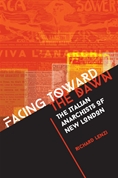review

The complex history of working-class anarchism and syndicalism in the United States has been understudied. A good part of the problem is language. German, Spanish, Finnish, and Yiddish sources have been utilized by a handful of scholars, but mostly decades . . .
Read more ›
review

Steve Fraser is a weathered veteran of the New Left and many subsequent movements, author of shrewd books on the acquisitive ruling class and also of the outstanding biography of famed left-leaning labor giant Sidney Hillman, among other works. Here he once again ranges far, but also comes close to home, his own personal home space.
review

The closing of the era when comic art specialists, not people with PhDs, wrote the outstanding and recognized works on individual artists and genres may have arrived as recently as only a few years ago. Careful biographies of artistic giants, household names (in their own eras, at least) or famed only within the field, Al Capp or Will Elder, have continued to be written by people who could rightly be called “fans”—if the title did not seem insulting. Rather than university presses, Fantagraphics or the comics series at Abrams would be a typical outlet. With each year that passes and with each swelling enrollment in a college course, the scene shifts.
review
Reading, actually looking obsessively at the pages of, this volume and non-volume inevitably brings to mind an unpublished, uncompleted 1967 essay by Herbert Marcuse, “Lyric Poetry After Auschwitz,” translated and published after his death. Here Marcuse says, in part,
Interview with Eli Valley
The most vivid and without a doubt, the most disliked (make that, hated) comic-artist critic of Jewish power plays, from Tel Aviv to Los Angeles, Eli Valley ranks high among the most Jewish comic artists anywhere in the world today.
A new edition of Marxism in the U.S. seems to have come at a propitious historical moment not only for global society but also for phenomena that can still, with many reservations, be called Marxism, Marxist ideas, Marxist-based projects. The particular crises at hand, economic, social, political, and ecological, are so numerous and fast-breaking that headlines are likely to overtake specifics even before words reach print. But crises they are.

By this time, the usual New Politics reader may well have seen dozens if not hundreds of Youtube videos revealing the demonstrations in Madison, Wisconsin, during February and March, not to mention sights and sounds of solidarity-with-Wisconsin rallies around the country and in their own community. (Being good New Politics readers, they would have joined in.) The details have been hard to follow, even close to the scene.
A small and curious bulletin begins this note from the front lines: as of several hours ago, the head of the Wisconsin professional police association announced that its members would not eject demonstrators from the Capitol building, and suggested some would be spending the night with the demonstrators in order to protect them.
review
Labor’s Civil War in California
Cal Winslow
Oakland: PM Press, 2010, 115pp, $12
Shades of Justice: A Memoir
Paul Krehbiel
Altadena, CA: Autumn Leaf Press,
2008, 422pp, $19.95
Anything Herman Benson writes on the labor movement is provocative and useful for discussion — even if on occasion, in my view, it also happens to be somewhat skewed. When organized labor faces the prospect of a turning point as potentially large and also as disappointing as that of ten years ago, the implications loom before all of us.




